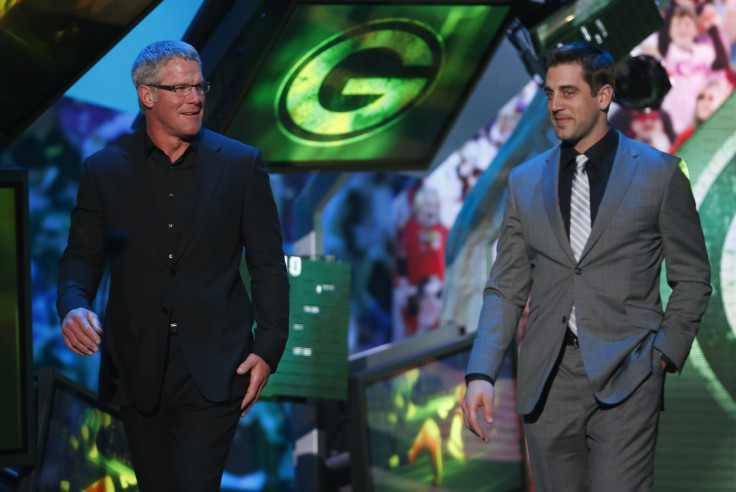Brett Favre, Aaron Rodgers Stat Comparison: Who's The Better Green Bay Packers Quarterback?

It’s been nearly eight years since Brett Favre stepped onto Lambeau Field as the Green Bay Packers starting quarterback, but the former three-time MVP will make his return next season when his jersey is retired in the team’s Hall of Fame, Favre announced on his official website Monday.
Favre spent 16 seasons as the Packers signal caller, winning seven division titles and one Super Bowl to go along with his three first-team All-Pro honors and nine of his career 11 Pro Bowl appearances.
But in the days leading up to Favre’s enshrinement, the main topic of conversation will undoubtedly evolve into a comparison of Favre and Green Bay’s current starter, Aaron Rodgers.
Rodgers spent three years behind Favre on the Packers sideline before taking on full-time duties in 2008, and neither he nor the Packers have looked back since. Over the last seven years, Rodgers has arguably become the best quarterback in the NFL, a distinction Favre also held during his years at Lambeau.
Let’s take a look at both stars first seven years as starters and see who, at least statistically, has the edge.
Starts
Renowned for his ironman toughness, Favre totaled a 74-35 record as a starter in his first seven seasons, capturing three division titles and his lone Super Bowl in 1996. Favre also missed only one game in 1992, his first year in Green Bay, and didn’t miss another start until 2000.
Rodgers missed nine games due to injury, most of which were in 2013 when he went down with a broken collar bone, but he’s amassed a 70-33 record over 103 stars and won three division titles.
However, in his first year as starter the Packers went 6-10, and Favre only endured one losing season throughout his 16 years with Green Bay.
Advantage: Favre
Touchdowns
For three straight years, 1995-97, Favre led the NFL in touchdown passes and he amassed a total of 213 his first seven years in Green Bay.
Rodgers bested him by 12, with a grand total of 225, and he’s done so by playing in nine fewer games. But it was technically a much more physical league when Favre played compared to now, with NFL referees now hitting defenses with roughing the passer flags for even the slightest infraction.
Also considering the era, Favre’s best stretch of 38, 39, and 35 touchdowns from 1995 to 1997, looks astounding.
Advantage: Favre
Yards
Again the era of the NFL has to be taken into account, but Rodgers has the better numbers with 28,249 yards compared to Favre with 26,803 yards over nine fewer games.
Over the seven year span, Favre broke the 4,000-yard barrier twice in 1995 and 1998. Rodgers has done it five times.
Advantage: Rodgers
Accuracy
Always the definition of a gunslinger, Favre let it fly but was very accurate throughout his career, completing 62 percent of his passes. But Rodgers has been far more accurate early in his career.
In his first season in Green Bay, Favre completed 64.1 percent of his attempts, and his next best came in 1998 when he led the NFL with a completing percentage of 63 percent. He totaled 3,752 attempts in his first seven seasons.
In contrast, Rodgers has 3,416 attempts as the starter and his percentage has never dipped below 63.6, his first season under center. And in the last four years, Rodgers hasn’t dipped below 65.6 percent.
Advantage: Rodgers
Interceptions
Favre always took chances, and many times throughout his career they paid off, but he had a major propensity to throw interceptions. He totaled 116 picks from 1992 to 1998, leading the NFL with 24 in 1993 and throwing another 23 in 1998.
In the same span, Rodgers has only 56 interceptions and only twice has his season total eclipsed 10. In the last four seasons he’s never thrown more than eight in 16-game schedule. He’s also posted a quarterback rating no lower than 101.2 throughout his career as a starter.
The only time Favre ever posted a triple-digit passer rating for a season came in 2009 with Minnesota.
Advantage: Rodgers
Rushing
It might seem silly to compare the rushing stats of two of the most prolific quarterbacks to ever play, but it usually is a good indicator of a quarterback’s ability to either gain a first down or extending a play to allow a receiver to get open.
Favre gained 1,253 yards and scored 11 touchdowns from 1992 to 1998, compared to 1,784 yards and 20 touchdowns for Rodgers.
The nod has to go to Rodgers, who’s rushed for more than 200 yards in in six seasons, and more than 300 twice.
Advantage: Rodgers
Postseason
It could be said that Favre saved his best play for the postseason. He amassed a 9-5 postseason record, racking up 25 touchdowns to 12 interceptions and in 1995 and 1996 totaled passer ratings of 106.9 and 107.5, respectively.
Rodgers has a 6-5 record with 23 touchdowns to seven interceptions, but since winning the Super Bowl in 2010, his passer rating hasn’t exceed 97.8.
Rodgers did claim the Super Bowl MVP when he won, with Desmond Howard winning it over Favre in 1996, but there’s little doubt who led that Green Bay squad to victory.
Advantage: Favre
Comebacks and Game-Winning Drives
This became a Favre specialty throughout his career. He totaled 10 fourth-quarter comebacks and 13 game-winning drives. But Rodgers isn’t too far behind with eight fourth-quarter comebacks and 12 winning drives.
A tie could be their clutch play in the postseason, but in seven years both massed one fourth-quarter comeback and one winning drive.
Advantage: Favre
Tally: 4 to 4
Judgment: The numbers suggest this comparison is too close to call. It’s fair to call it a tie now, but Rodgers, 31, can still claim more Super Bowls with plenty of years left on his career.
© Copyright IBTimes 2025. All rights reserved.





















